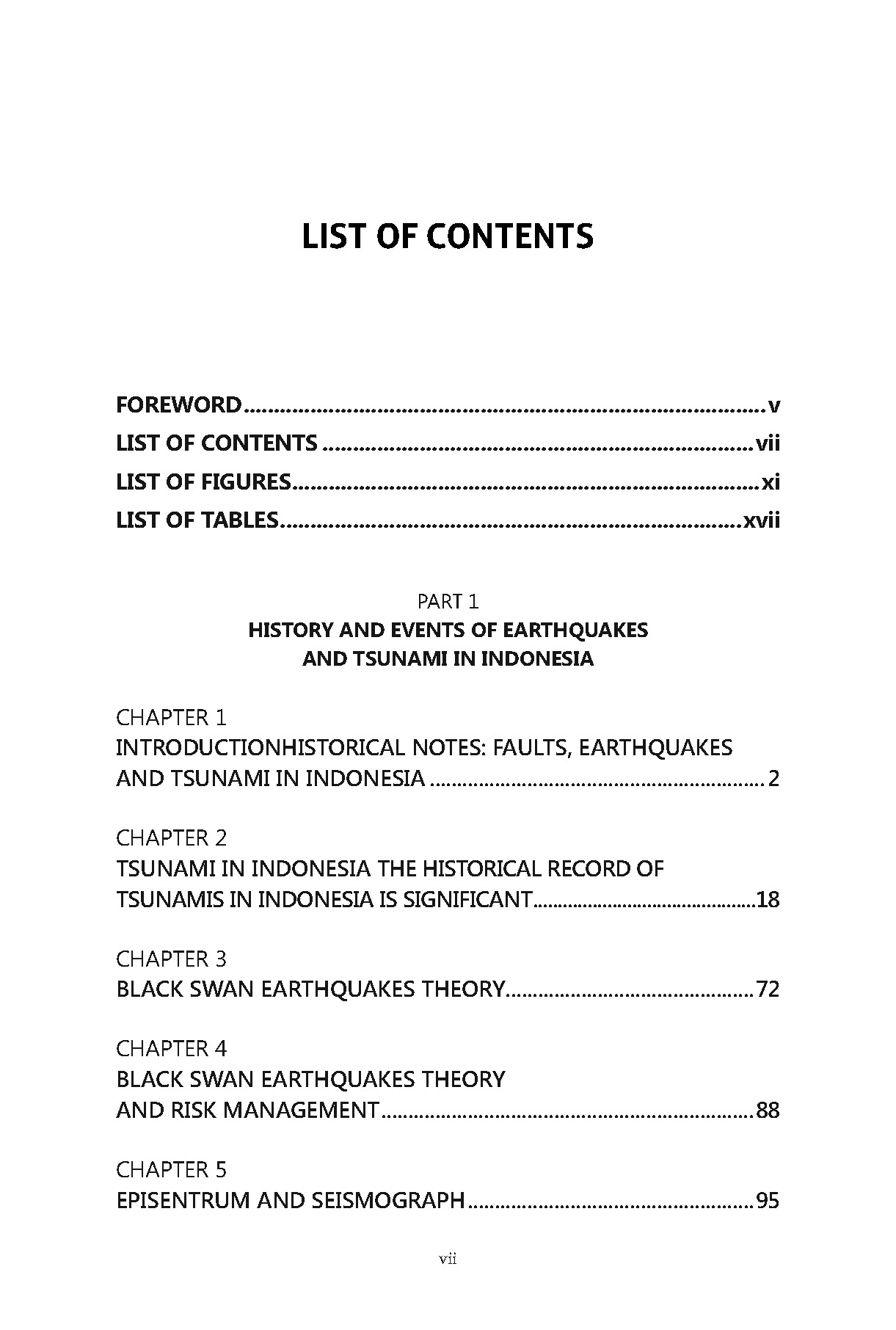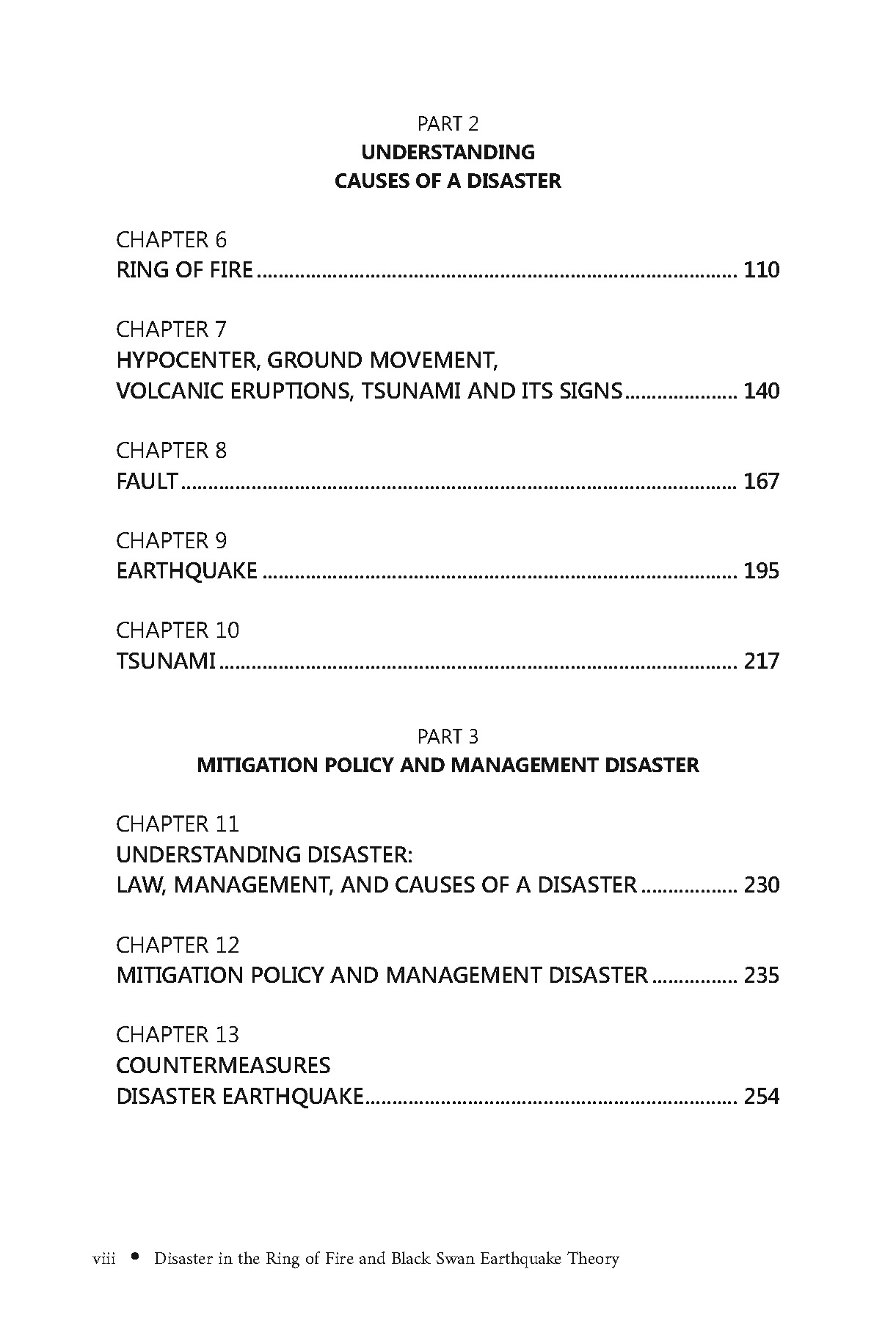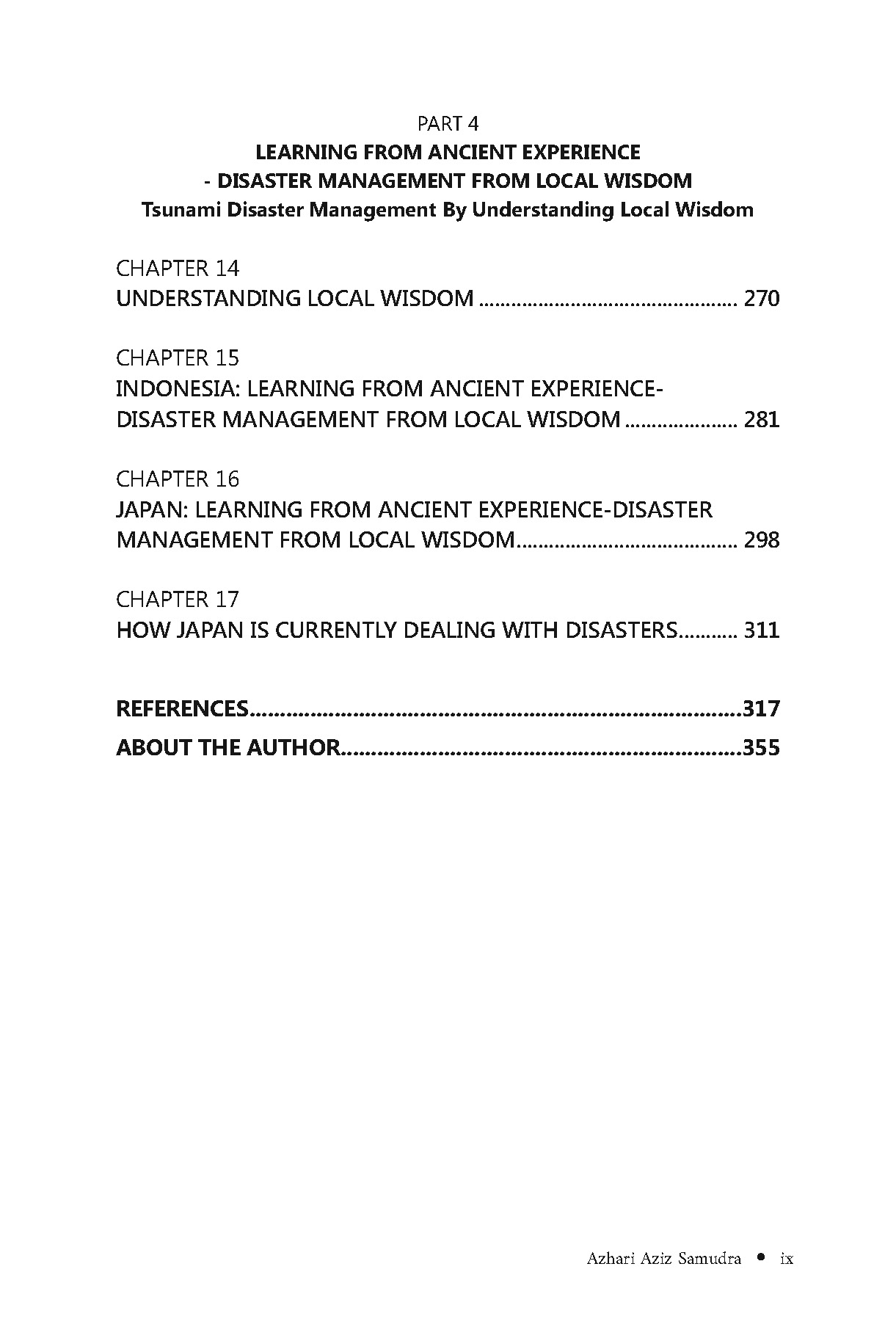DISASTER IN THE RING OF FIRE AND BLACK SWAN EARTHQUAKE THEORY Techniques for Disaster Management with Modern Technology and Local Wisdom
Melalui buku ini, membekali calon doktor dan pembuat kebijakan dengan pemahaman menyeluruh tentang bencana alam seperti gempa bumi, tsunami, dan kondisi patahan di Indonesia dan wilayah lain di seluruh dunia

BLACK SWAN EARTHQUAKES THEORY
This book serves as reference material for Public Administration, Public Policy, and Disaster Mitigation Doctoral Program students. It aims to equip doctoral candidates and policymakers with a thorough understanding of natural disasters such as earthquakes, tsunamis, and fault conditions in Indonesia and other regions worldwide. By comprehending the causes and impacts of these disasters and the necessary solutions and decisions, individuals in these roles can effectively contribute to the well-being of communities.
Moreover, the book addresses stakeholders and policymakers at various levels of governance in Indonesia, urging them to grasp the geographical realities of the Indonesian region, situated within the Pacific Ring of Fire, alongside 20 other countries. It emphasizes the seismic vulnerability of these regions and the imperative for disaster policy decision-makers to be well-informed and proactive in their approaches.
This book consists of four parts and 17 chapters, and diverse topics, from historical accounts of faults, earthquakes, and tsunamis to contemporary mitigation policies and practices. Part 1 explores the historical context of natural disasters in Indonesia, including significant events such as the Aceh tsunami and the 1,797 earthquake. Part 2 elucidates the geological causes of disasters, emphasizing phenomena like the Ring of Fire and fault lines.
Part 3 focuses on mitigation policies and disaster management phases, elucidating the four stages of disaster management and drawing lessons from past disasters like the Aceh tsunami. Part 4 delves into utilizing local wisdom in disaster management, exploring ancient earthquake detection methods, bamboo utilization for earthquake detection, and traditional instruments like Kentongan bamboo in disaster alert systems.
Parts 3 and 4 serve as the crux of the book, elucidating the importance of public and mitigation policies for policymakers at all levels of governance. It underscores the significance of integrating conventional methods employed by indigenous communities with contemporary approaches to disaster prevention and response. Through this holistic approach, policymakers can mitigate the adverse impacts of natural disasters and foster environmental stewardship to prevent future calamities originating from human
actions.
The book underscores the importance of integrating traditional wisdom with modern policies to manage natural disasters effectively. It advocates for proactive measures prioritizing environmental conservation and community resilience, thereby mitigating the adverse impacts of natural and human-induced disasters. Through a comprehensive understanding of disaster dynamics and applying local wisdom, policymakers can foster sustainable disaster management practices for societies and the environment’s well-being.
Dapatkan Bukunya Sekarang Juga!
DAFTAR ISI
 Daftar Isi 1
Daftar Isi 1 Daftar Isi 2
Daftar Isi 2 Daftar Isi 3
Daftar Isi 3Spesifikasi Buku

Cetakan I, Februari 2024; 374 hlm, ukuran 15,5 x 23 cm, kertas isi Bookpaper hitam putih, kertas cover ivory 230 gram full colour, jilid lem panas (soft cover) dan shrink bungkus plastik.
Harga Buku
Sebelum melakukan pembayaran, cek ketersediaan stock kepada admin. Jika buku out of stock pengiriman membutuhkan waktu – 3 hari setelah pembayaran.
Rp 200.000
Rp 185,300
Tentang Penulis

Prof. Dr. Azhari Aziz Samudra, M.Si.,
received the title of Professor in 2010 and is a Professor of FISIP, Muhammadiyah University, Jakarta, and teaches the Disaster Mitigation Policy Implementation Doctoral Program. He has special interests in science policy, regional government, local wisdom, religion, and astronomy. Obtained a bachelor’s degree at Faculty of Social Science and Political Science, University of Indonesia (1986), Master of Science at Faculty of Social Science and Political Science, University of Indonesia (1991), and a Doctoral degree at University of Indonesia (2008).
eaching at the Faculty of Social Science and Political Science, Doctoral and Postgraduate Program Muhammadiyah University Jakarta, PPS Ngurah Rai University Bali, and PPS Krisnadwipayana University. He was once on the Professorial Examining Team at Kopertis Wil 8 Bali, the Examining team for the Doctoral Program at Pasundan University, Bandung, and Jakarta State University. He served as President of the Asia Pacific Society for Public Affairs (2014-2017), Director of the Local Government Innovation Center (2018-2022), Director of Postgraduate Studies at Ngurah Rai University Bali (2010-2014), Dean of the Faculty of Krisnadwiyana University (2014-2022), and Management Jakarta Scholars Association (2018-2022). He has also been on the Selection Team for Candidates for Deputy Governor and Head of Jakarta Government Services (2014- 2016) and on the Selection Team for Candidates for Deputy for the Indonesian Ministry of Political, Legal, and Security Affairs (2014- 2015).
He has led numerous research groups published in books and articles. Books that have been published are Drought Disaster Management Policy: Proposed Regional Disaster Management Master Plan in East Lombok Regency, Indonesia; Public Policy and Disaster Mitigation; Black Swan Earthquake Theory and Public Policy Implementation in Disaster Mitigation; Earthquake Disaster Mitigation in Cianjur; Implementation of Public Policy and Evidence- Based Policy; Management of Distribution of Logistics Assistance for Disaster Survivors: Study of the Makassar Flood in South Sulawesi; Disaster Mitigation in the Malang Kanjuruhan Stadium Tragedy: Policy Study in Social Crime Disasters; Implementation of Emergency Accident Preparedness Mitigation and Railway Response Management Policies; The Power of Local Wisdom: Its Ability to Avoid and Resolve Social Conflicts and Regional Government Regulations in Minangkabau; Consideration of Local Wisdom in the Perspective of Public Administration and Public Finance; The Position of Sasak and Balinese Local Wisdom in the Implementation of Public Policy in Indonesia.